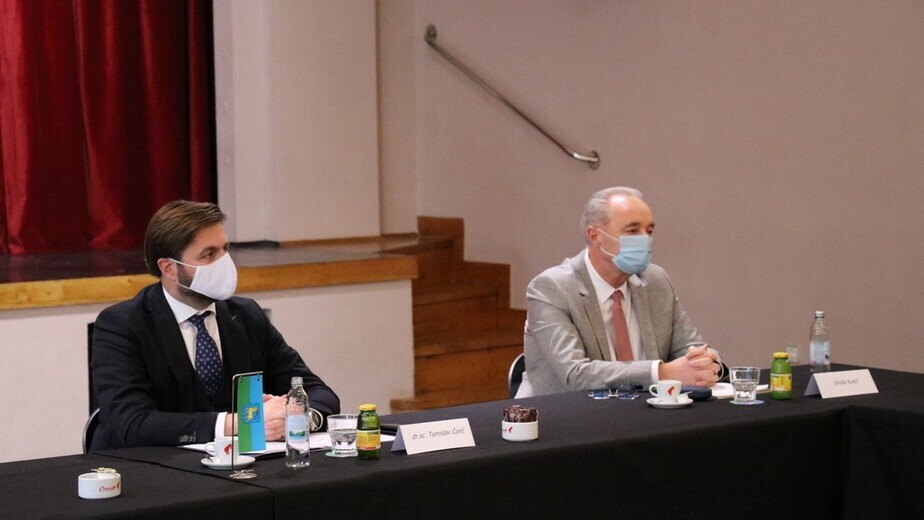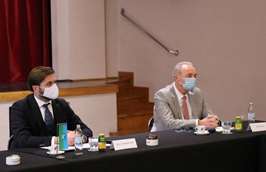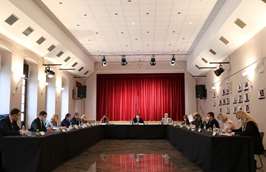23.02.2021.
Integrated waste management system was the main topic of today’s working meeting held in Pula. The participants included: Minister of economy and sustainable development Tomislav Ćorić, PhD, and his associates, Director of the Fund Siniša Kukić, acting county mayor Fabrizio Radin, the mayor of Pula, Boris Miletić, the mayor, of Rovinj Marko Paliaga, and the member of the CWMC Kaštijun Board Vesna Dukić, with their associates.County mayor Radin expressed his appreciation of the meeting, the topic of which was integrated waste management.
“We had the opportunity to discuss all the challenges faced by our utility companies. We have received satisfactory answers and we will continue discussions until we come to the final solution,” said the county mayor, thanking minister Ćorić for his participation.
Mayor Miletić said that the accession to the EU meant we had accepted environmental directives, with Istria and Primorje-Gorski Kotar Counties being the only ones that had made headway in terms of environmental protection and sustainable waste management. This meant considerable changes, and we are all aware of what this means for our Town and citizens; it implies the new way of collecting waste and its separation at source. The Town of Pula started the campaign back in 2008 with the youngest generations in nursery schools, in cooperation with the civil society associations. The mayor of Pula said they wanted to achieve not only the goals set at EU level but also protect the environment, for which it was vital to establish the cooperation at national, regional and local levels, all the way down to the smallest council. He thanked minister Ćorić and director Kukić, and all the citizens who were responsibly separating the waste in their households.
The minister evaluated today’s discussion as being on point and appropriate. He believes that in the past 10 years Istria County has definitely made headway regarding waste management and was moving in the direction that Croatia in general should follow, i.e. build waste management centres.
“From our point of view, Istria has accomplished a huge task. In the last years we have put a lot of efforts in building the infrastructural basis: constructing recycling yards, financing sorting plants, containers and trucks for the transport of special categories of waste, meaning a number of infrastructural elements contributing to an efficient system. This is a challenging journey and is likely to take some more time,” pointed out the minister, adding: “Today I had the chance to hear about the challenges faced by the units of local self-government in Istria County in implementing the Waste Management Plan, which was formulated 3-4 years ago. I had the opportunity to hear very good proposals put forward by Mr. Miletić and other participants regarding the functioning and financing of Kaštijun, the charges paid by LSGUs and the methodology for calculating the incentive fee. I will leave satisfied because Pula and Istria, as far as Kaštijun is concerned, and this is very important, are the exemplar of how it can all be organised, regardless of the challenges they face in waste management in their area.”
To the question about the Government Strategy for refuse derived fuel (RDF) disposal, which was agreed at the Government session in Pula in 2018, Minister Ćorić replied that this issue had been discussed again that day.
“We decided in the previous period to co-finance the disposal of RDF from Kaštijun, through the Environmental Protection and Energy Efficiency Fund, to facilitate the financial position of Kaštijun as legal person. On the other hand, Croatia’s long-term plan is to designate, at national level, the locations where RDF will be disposed of, which is today the case in several Croatian cement plants. This problem has to be solved at national level because in the case of cement works this implies market competition, which could be very costly at this moment for our waste management centres, Kaštijun and Marišćina,” said the minister.
The director of EPEEF Siniša Kukić said that the Fund was supporting the projects in Istria County financially and with expertise, and he expressed his satisfaction with cooperation with Istria County and Istrian units of local self-government.
“The last one in a number of projects we will co-finance is the renovation of the Orthopaedics and Rehabilitation Special Hospital “Martin Horvat” in Rovinj, for which we have granted around 700 thousand kunas,” said Kukić.








